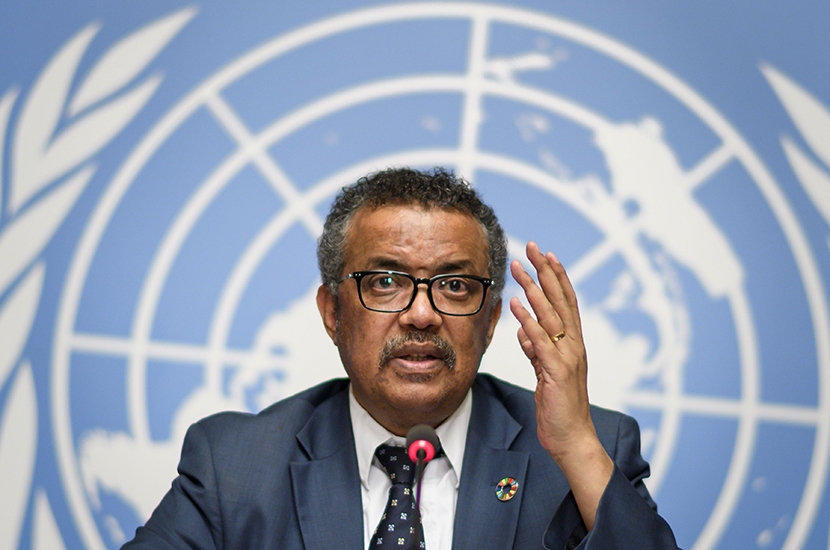The United States has long regarded itself as better prepared for a pandemic than any other country in the world, but it assumed the disease would be flu, rather than a coronavirus. This was a failure of imagination. The Sars epidemic showed the world that coronaviruses can lead to acute and fatal respiratory diseases. The Asian countries that suffered most from Sars updated their pandemic response kits accordingly, with mass testing and patient-tracing technology. Neither Britain nor America thought to do likewise.
In Britain, we’re starting to admit to flaws in our pandemic response. Donald Trump is less inclined to do so, and is instead directing his fury at China and promising to remove funding from the World Health Organisation. There are a far wider number of questions President Trump should be asking his own government agencies, but it’s useful in politics to remember: just because Trump says something, it does not make it wrong. And on the WHO, Trump does have a point.
The WHO is supposed to be the world’s early warning system for new viruses. The most obvious risk comes from China, whose industrial transformation has led to huge growth in urban markets where live animals are sold to feed the workforce. In Guangdong a billion chickens are raised each year. Factor in the other wild animals on sale, the smallholders keeping pigs close to chicken pens, and you end up with viral cauldrons brewing potentially lethal diseases.
The WHO has failed for a very simple reason: both it and its director-general are far too close to China
China’s political system is one that tends to suppress embarrassing disclosures such as the emergence of a new virus — it did the same with the Sars epidemic. This is why the WHO needs leadership capable of being sceptical about official information coming from China. Its director-general, Tedros Adhanom Ghebreyesus, has failed this test miserably. The more we learn about Sars-CoV-2, the virus strain which causes Covid-19, the more it becomes clear that the window of opportunity for preventing its global spread was narrow. By the middle of February, when it became clear that the virus had taken hold in Europe, it was too late. Where was the WHO in those vital weeks?
In the middle of January, a WHO delegation declared that there was ‘no clear evidence of human to human transmission’. Yet by then it was already quite obvious that Chinese authorities had sought to engage in a cover-up. The police had actually threatening a Wuhan doctor, Li Wenliang, with arrest for daring to warn colleagues of a new illness which had reminded him of Sars. In the end, Dr Li died of Covid-19 himself.
Rather than chasten China, WHO praised the country. Dr Tedros commended the country for its ‘transparency’ and declared that ‘if it weren’t for China the number of cases outside China would have been very much higher’. To say that this misses the point is a serious understatement. The Covid outbreak has tentatively been traced to Wuhan. The virus found in bats there is a very close genetic match for Sars-CoV-2. Sars was traced to civets on sale for human consumption in China, while another strain of influenza virus in 2013 (as well as the viruses which caused the flu pandemics of 1957 and 1968) are believed to have originated in China.
The WHO has failed for a very simple reason: both it and its director-general are far too close to China (which is, by the way, a large investor in Dr Tedros’s native Ethiopia). The WHO’s bias became absurdly clear when a Hong Kong reporter asked Bruce Aylward, head of the joint WHO–China mission on coronavirus, whether Taiwan — which has led an especially effective campaign against the disease — might be admitted to the WHO. Dr Aylward pretended not to hear the question, mindful that Beijing would not tolerate discussion of Taiwan. (Dr Tedros does not have a great reputation for transparency about outbreaks of infectious disease in any case: while serving as Ethiopia’s health minister he was implicated in covering up an outbreak of cholera.)
The WHO’s problems go back further than Dr Tedros’s time at the top. On several occasions before he arrived in 2017, it had pressed the panic button when no panic was warranted. In 2005 it claimed that the H5N1 avian flu could kill between five million and 150 million people around the world. The final death total was fewer than 500. In 2009 it declared a ‘pandemic’ of swine flu — only to apologise later, when it emerged that it was no more lethal than normal flu.
Perhaps this is what made it slow to act on Covid-19, but soon afterwards it went into full panic mode, demanding that western countries introduce Wuhan-style lockdowns. The efficacy of such draconian measures has never been tested and the true cost — in lives, not just money — might not become clear for years. The global crash certainly isn’t going to help Dr Tedros’s campaign for the whole world to enjoy universal healthcare free at the point of delivery.
A WHO that was worth its salt would long ago have worked out a protocol for dealing with new diseases. Once the Covid deaths were piling up, it urged testing — but this was not useful advice for western countries that didn’t yet have the tests. The point ought to have been made, forcefully, at a much earlier stage. The WHO should have had a detailed strategy in place for containing new infections — and one which didn’t result in crashing the global economy. If it’s beyond it to devise such a thing, it is time to hand the job to someone else.






Comments